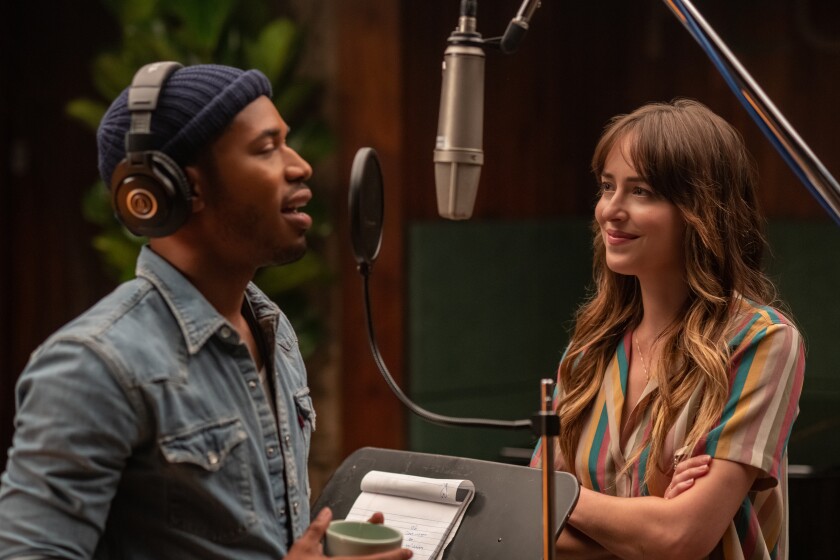

One of Dakota Johnson’s strengths as an actress is her ability to catch the viewer off-guard. She leads with a smile, a shrug, an air of calculated naiveté, only to pull the rug out from under anyone foolish enough to underestimate her.
That was what made her so effective in the “Fifty Shades of Grey” movies, where she took a romantic heroine too easily subjected to knee-jerk dismissals and endowed her with a canny, complicated inner life. She was a veritable wellspring of dark vibes and naughty secrets in Luca Guadagnino’s art-house potboilers “A Bigger Splash” and “Suspiria.” But as far as genuine surprises go, it would be hard to top her withering cut-the-crap appearance on “The Ellen DeGeneres Show” last year: If you thought Johnson would be the last celebrity to politely dismantle a talk-show host on the air, you thought wrong.
Johnson goes toe-to-toe with a different kind of diva but keeps her scalpel mostly sheathed in “The High Note,” a silky-smooth music-industry fairy tale from director Nisha Ganatra. As personal assistant to R&B/pop superstar Grace Davis (Tracee Ellis Ross), Johnson’s character, Maggie, is introduced in one of those frenetic errand-running montages familiar from aspirational comedies like “The Devil Wears Prada” and “Set It Up.” The Pacific coastline and the Capitol Records building flash into view as Maggie tears up and down the freeway, her car overflowing with party supplies, organic juices and whatever else Grace needed five minutes ago.
But their working relationship, though inevitably lopsided, is appreciably warmer and more genteel than what we’re used to. Maggie, the daughter of a laid-back Catalina Island disc jockey (a charming Bill Pullman), is a passionate and knowledgeable music lover. And even if she sees her job as a long-shot stepping stone to that producing career she’s always wanted, her interest in her employer is not entirely mercenary. She respects Grace as an artist and, unlike some of the paid sycophants in her orbit, knows her work inside out. For her part, Grace, whom Ross endows with a layered mix of hauteur and decency, surveys Maggie with fascination as well as impatience. Mutual understanding flickers between them in their occasional stretches of downtime, some of them set aboard Grace’s private jet as they bounce from one U.S. tour stop to the next.
Ice Cube in the movie “The High Note.”
(Glen Wilson)
The touring is slowing down, though. Even as “The High Note” gently humors Maggie’s attempts to move up in a ruthlessly competitive industry, it casts a sympathetic glance at her formidable, embattled boss as she negotiates her way down. While Grace is eager to dig into new material, both her tough-minded manager (an enjoyably ticked-off Ice Cube) and the executives at her record label are aggressively nudging her to take a victory lap and focus on her hits with a 10-year Las Vegas residency. It’s the industry equivalent of getting kicked upstairs.
The leads’ emotional and professional dynamic — one young woman trying to find her groove while her boss struggles to get hers back — is nearly identical to that of “Late Night,” Ganatra’s enjoyable 2019 crowd-pleaser starring Emma Thompson and Mindy Kaling. That movie had the benefit of a consistently funny script (written by Kaling) that took its cues from its TV writers room milieu. “The High Note,” written by Flora Greeson, sits less comfortably on the fence between insiderish melodrama and broadly accessible crowd-pleaser.
Its occasional attempts to become the latter — most evident whenever tough-talking second bananas like Maggie’s roommate (Zoe Chao) and Grace’s housekeeper (June Diane Raphael) drift into the frame — can feel rote and strained, as if the movie were trying to contort itself into a humorous shape. At other times, it affects a knowing, insiderish tone, with only moderately more success: There are cameo appearances by Eddie Izzard as a burned-out recording artist and popular DJ-songwriter Diplo as a producer with some very bad ideas for a Grace Davis revamp.
Like “Late Night,” “The High Note” wants to say something significant about what it means to be a woman over 40 — and a woman of color — in an entertainment industry where racism, sexism and ageism have long formed an unholy governing trinity. But by my count, it devotes exactly one scene to addressing those tough realities and spends the rest of its nearly two-hour running time buffing its characters and their privileged milieu to a pleasing high gloss.

Kelvin Harrison Jr. and Dakota Johnson in the movie “The High Note.”
(Focus Features)
Not that there is anything wrong with pleasure or with gloss. Jason McCormick’s warmly lighted images of beachfront mansions and Los Angeles rooftops looked good enough on my home TV to make me wish I could have seen them in a theater, as the movie’s U.S. distributor, Focus Features, once intended. The soundtrack is a veritable lazy Susan of rotating delights including Aretha Franklin, Cher, Sam Cooke, TLC and Cat Stevens. And there are far worse diversions than the recurring sight of Grace soaking up the attention of her still-adoring fans — not just because she gets to do so wearing Jenny Eagan’s splendid costumes but also because it’s touching to see Ross incarnate a version of her famous mother Diana’s own legendary stardom.
Ross isn’t the only star here paying affectionate maternal homage. More than once during “The High Note,” I flashed back fondly on “Working Girl,” Mike Nichols’ classic fable of corporate ascendancy starring Johnson’s mother, Melanie Griffith. Ganatra’s picture may not be in the same league, but Johnson, like Griffith, makes you feel her character’s devotion and ambition, her inevitable missteps and her ability to rebound from them. When Maggie stays up all night laying down tracks for her own cut of Grace’s album — or when she lets fly a sharp remark in a meeting, leaping confidently to Grace’s defense — you recognize her instinctively as someone who misses (almost) nothing and pours herself tirelessly into even the most thankless tasks.
You want her to have it all, and like any self-respecting fairy tale, “The High Note” does too. To that end, it contrives a ludicrous and fairly irresistible subplot involving a promising young singer-songwriter, David (Kelvin Harrison Jr.), who becomes a source of intense professional and eventually romantic interest for Maggie. The sheer force of Harrison’s charm here might prove even more disarming if you saw his anguished troubled-teen performances in “Luce” and “Waves”; here, he’s almost unrecognizably happy, mellow, flirtatious and winning by comparison, with a guitar in his hand, a song on his lips and, in time, a studio microphone in his face. Like “The High Note” at its intermittent best, he gives wish fulfillment a good name.
‘The High Note’
Rating: PG-13, for some strong language and suggestive references
Running time: 1 hour, 53 minutes
Playing: Available May 29 on VOD platforms





